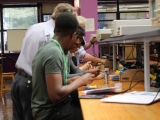Students have amazing work experience in Electrical & Electronic Engineering
by Kay Hancox

Last week, the Department took part in Imperial College's Year 12 Work Experience Programme, and twelve students joined us as part of the course.
“Thank you for an amazing week, a once in a lifetime opportunity”. “Wow! Truly Amazing!”
The Department as well as the Departments of Chemistry, Materials, Physics, and the National Heart and Lung Institute hosted students. The purpose of the week was allow students to experience the exciting world of research and gain a flavour of university life. Our Department received 77 applications for 12 places.
Kay Hancox, Outreach and Recruitment Manager, put together a varied programme for the 12 students which included visiting our labs and interviewing members of staff about their research, talks and creative activities.
The highlight of the week was a morning spent with a research group. The students were paired up and each pair visited a separate research group. They spent their time there talking to professors, lecturers, research assistants, and PhD students about their work, and seeing research in progress.During the remainder of the week they attended talks on a wide range of topics.
 On the first day the students met Dobby the Nao Robot, and learned from Dr Patrick Naylor and Dr Alastair Moore about their research into speech processing, and how they are working to improve interactions with robots in noisy spaces.
On the first day the students met Dobby the Nao Robot, and learned from Dr Patrick Naylor and Dr Alastair Moore about their research into speech processing, and how they are working to improve interactions with robots in noisy spaces.
Professor Richard Syms warned them of the dangers from eating uncooked fish in Thailand due to links with Cholangiocarcinoma, and his work in improving imaging diagnostics to detect this disease. Dr Oleksiy Sydoruk told students about the RFIDs that make their Oyster cards work.
Dr Pantelis Georgiou gave an “insightful lecture that told us of the extraordinary research in engineering that has changed the lives of many diabetic patients who have received his Imperial-developed electronic pancreas that simulates a real pancreas”
Professor George Constantinides taught them about the major advances in microprocessors and FPGA technologies and how they are being implemented into everyday objects such as toasters. Professor Kin Leung, talked to the students about communications, how the subject has evolved, and how excited he is for the future. Dr Christos Bouganis tested the student’s mathematical skills and discussed sorting elements.
There were also talks from two of our PhD students. Himadri Das spoke to the students about his research into powertrain control for automotive systems. Tricia Adjei, PhD student with Professor Danilo Mandic talked to the students about her enthusiasm for signal processing and her fascinating project which is looking at quantitatively modelling stress. She has been using small devices to measure stress in musicians. The students also spent with time Bulat Khusainov of the Control and Power group, who with the aid of a model crane allowed the students to see why automatic control of cranes is better than manual control.
 Dr Adrià Junyent-Ferré combined a lecture on statistical methods in engineering with a practical activity where the groups had to design build a paper parachute and time how long it took to land. The twist was that the winning design would not be the one with the longest time in the air, but based around the standard deviation and t-distribution of five flights.
Dr Adrià Junyent-Ferré combined a lecture on statistical methods in engineering with a practical activity where the groups had to design build a paper parachute and time how long it took to land. The twist was that the winning design would not be the one with the longest time in the air, but based around the standard deviation and t-distribution of five flights.
 The final practical activity was the building of a Decision Maker, an electrical device which which gauges passion by measuring electrical conductivity in the fingers and helps make decisions. One student said it was the ‘best lab activity’ he had undertaken.
The final practical activity was the building of a Decision Maker, an electrical device which which gauges passion by measuring electrical conductivity in the fingers and helps make decisions. One student said it was the ‘best lab activity’ he had undertaken.
There were a number of activities aimed at preparing the students for university including a talk on personal statements, one on electrical and electronic engineering degrees, one on scientific communication, and an introduction to an academic library in the form of a library treasure hunt.
 On the final day the students rejoined those from the other streams and produced posters about their experience. In the afternoon they gave presentations to the other students, their families and Imperial staff on their week which was followed by a poster session.
On the final day the students rejoined those from the other streams and produced posters about their experience. In the afternoon they gave presentations to the other students, their families and Imperial staff on their week which was followed by a poster session.
Thank you to all the staff and students in the Department of Electrical and Electronic Engineering who made the week so successful.
Article text (excluding photos or graphics) © Imperial College London.
Photos and graphics subject to third party copyright used with permission or © Imperial College London.
Reporter
Kay Hancox
Department of Electrical and Electronic Engineering